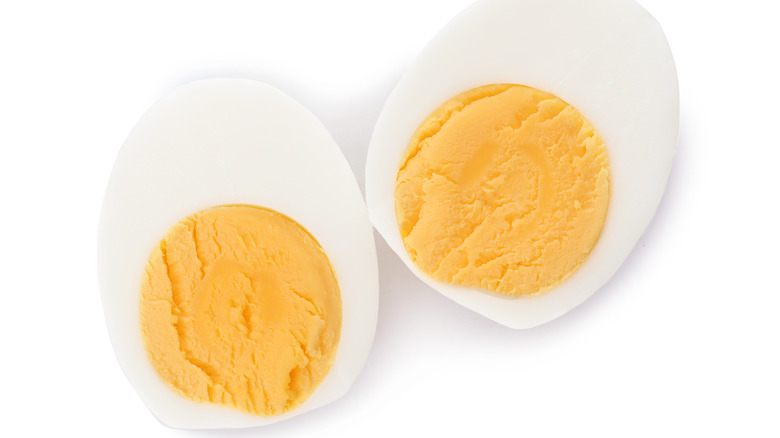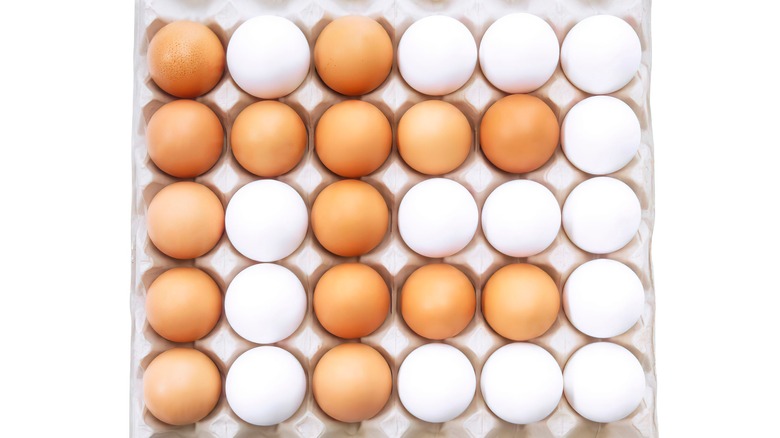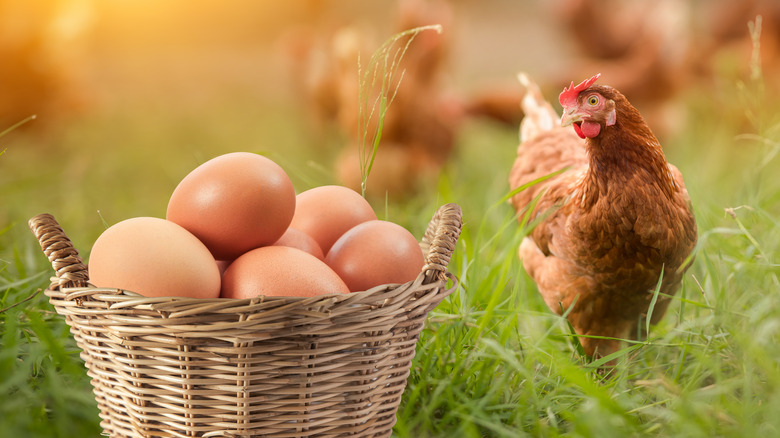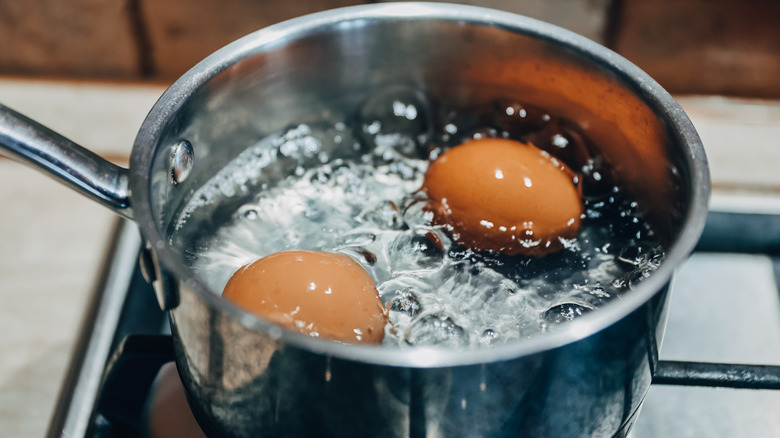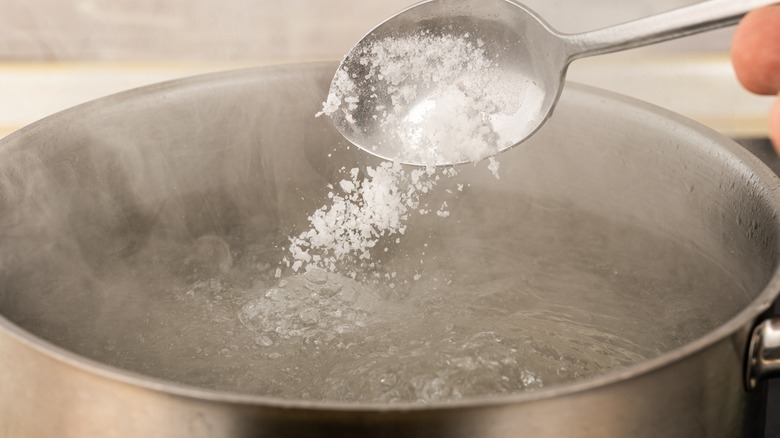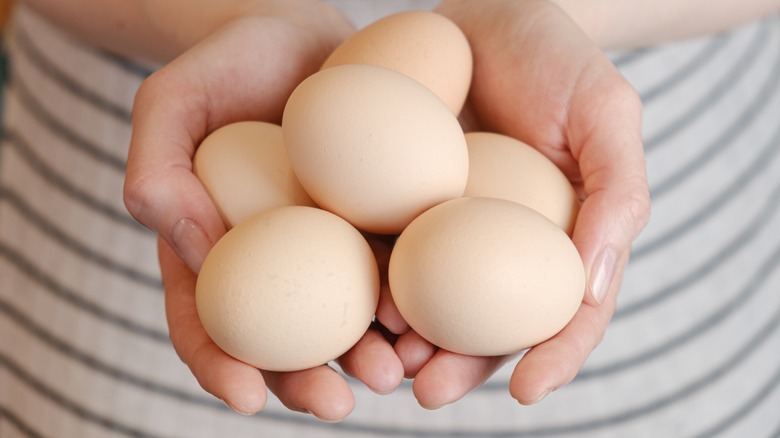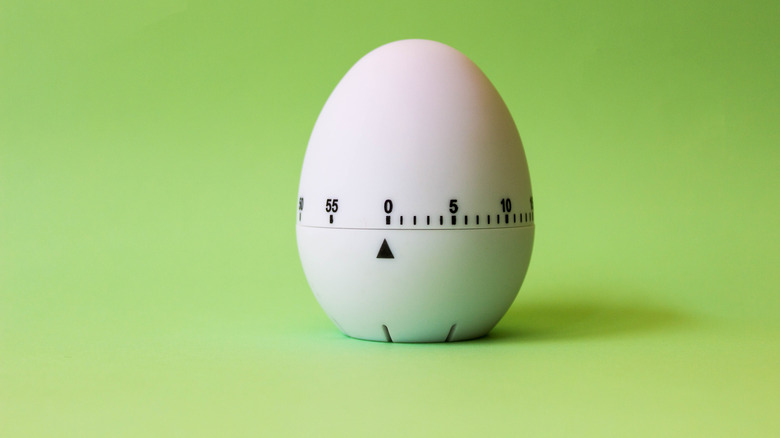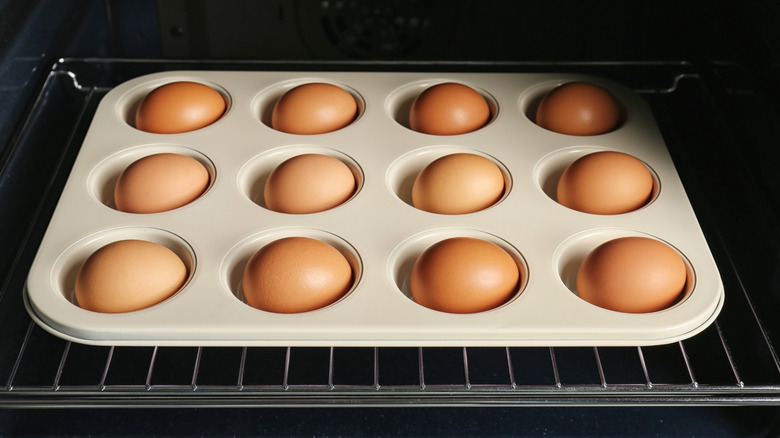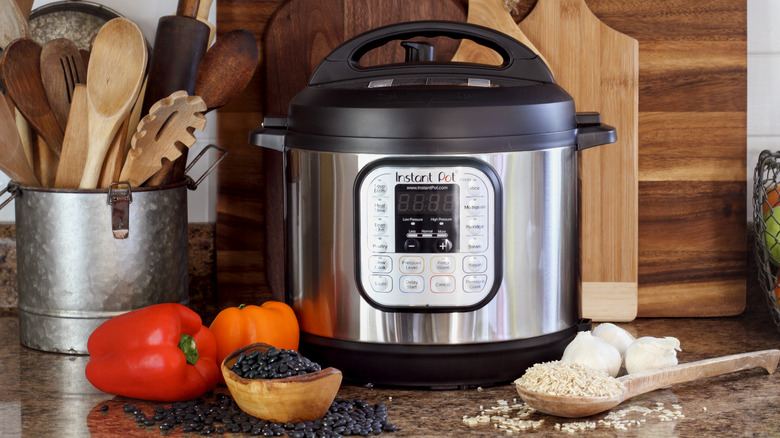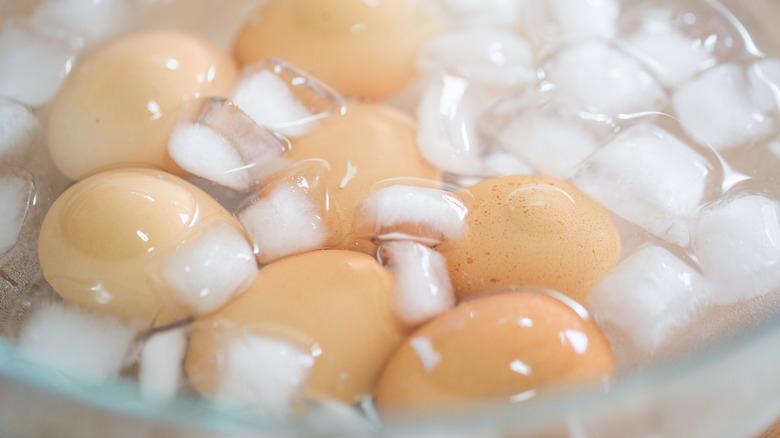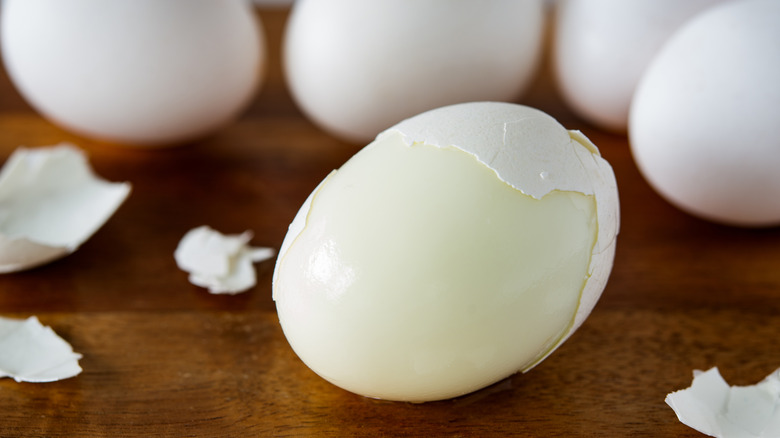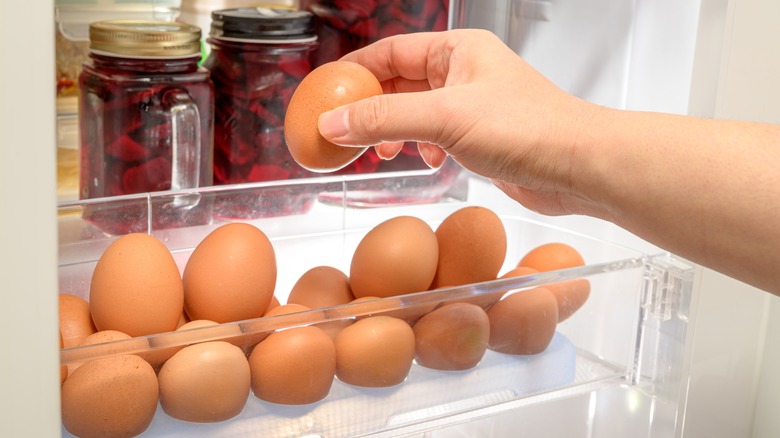All Of Your Hard-Boiled Egg Questions Answered
Hard-boiled eggs are fabulously versatile and easy to make. On top of that, they're a great source of protein which helps keep you full and encourages your body to repair and build muscle. According to Healthline, just one large egg contains between six to seven grams of protein. And since the average sedentary man needs about 56 grams of protein daily, and the average woman needs 46 grams, eggs are a great addition to your healthy meals (via USDA). But don't go too crazy — even good things are best in moderation. The maximum number of eggs you can eat each week before they become an unhealthy habit is seven. Why? Because eggs have a small amount of cholesterol, and that's something you don't want to overdo.
Before you eat any hard-boiled eggs, you have to decide how to cook them. With so many choices and plenty of opinions on making the best hard-boiled egg, it can get a bit confusing. Follow along and we'll get all your hard-boiled egg questions answered so you can enjoy an egg for breakfast, lunch, or a snack any time of the day.
Should I use a brown egg or a white egg?
Some people claim brown eggs taste better, but that might just stem from the fact that they are usually more expensive. The fact is, there's no difference between brown or white eggs when it comes to making a hard-boiled egg. As a matter of fact, the simple difference between brown eggs and white eggs is the hen. That's it. Brown hens lay brown eggs and white hens lay white eggs. Who knew?
There seems to be no difference in taste either. Consumer Reports writes that after testing a variety of eggs (which included a mix of brown and white shells), there was very little to no difference between the two except for, of course, the price tag. So, choose the eggs in your budget and enjoy. The only time you should truly be concerned about the color of the eggs you're hard-boiling is if you're going to dye them. In that case, you may prefer a white egg.
Do I need fresh eggs or older eggs?
It only makes sense to lean toward fresher foods. After all, who wants to eat old groceries? When it comes to your hard-boiled eggs, you don't want eggs that aren't safe to eat, but you do need ones that aren't too fresh. Have you ever tried to peel an egg after boiling it and found yourself ridiculously frustrated when chunks of the egg come off with the shell? The reason some eggs are hard to peel is that as the egg heats, the proteins bond with the membrane coating of the shell, causing the egg white to stick to the shell. The result is an egg that's difficult to peel.
Fresh eggs have a lower pH level, creating an even stronger bond between the egg white and the shell. So, what do you do? Shop for expired eggs? No, that's not necessary. However, when you bring home a carton of fresh eggs, you may want to wait a few days before hard-boiling them. If you wonder if you've waited too long, there's a simple way to tell if your eggs have expired. Grab a glass of water and gently place the suspicious egg inside. If it's a fresh egg, it will sink to the bottom because it has few air pockets. As an egg ages, it develops more air pockets. So if it sinks but stands upright, it's getting close to expiration but not yet there. Those two results are both safe to eat. If your egg eagerly floats to the top of the glass, throw it away.
What about boiling the water?
We're talking boiling eggs here, so there's going to be water involved. Please have a seat because this may shock you ... if you've been pouring hot water over your eggs in hopes of making them boil faster, you're doing it wrong. You may get water that boils quickly, but you'll also shock the eggs and risk plenty of cracked shells. You can prevent eggs from cracking while boiling by placing them in a pot of cool water rather than hot. An egg prefers a slow, leisurely bath rather than an instant rolling boil.
Also, don't boil eggs right from the refrigerator. Bring them to room temperature or you'll shock the poor eggs into cracking when they suddenly hit hot water. Cracked eggs make a mess in the pot as the egg whites sneak out. You can still eat a hard-boiled egg that cracks while cooking, but once the white starts leaking out, you'll have a distorted egg and an unattractive display of deviled eggs at the holiday table. Play it safe and start with cool water.
What should I add to the water?
Don't let the eggs and the water fly solo. There are a few things you can add to make the perfect hard-boiled egg. The first thing you may think of is salt. There's a good reason for that. For generations, we've all been told to add salt to the water when we are trying to get it to boil. Salt is a good thing for your boiling water, but it may not be for the reason you think. Salt won't make the water boil faster; however, it does help the water reach a higher temperature. But wait ... there's more. When it comes to boiling eggs, the best reason to add salt is that it helps the egg whites solidify quickly in the water should a leak occur, per Exploratorium. Basically, it helps maintain clean water when boiling eggs.
Another household staple that's always eager to help with many kitchen duties is baking soda. Throw a little baking soda in the water with the eggs to help raise the pH level, which in turn lowers the chance of the proteins adhering to the membrane. The result? Eggs that are easy to peel. Simply add about ½ teaspoon per quart of water.
Just like baking soda, vinegar has many surprising uses as well, and you'll want it on hand when hard-boiling eggs. Splash in a little distilled white or apple cider vinegar to soften up the shells as they boil, making them easy to peel.
Why do people poke a hole in the egg?
It may sound counterproductive, but one thing you should do before boiling an egg is to poke a hole in the large end of the shell before plopping it in the water. According to Exploratorium, pricking the egg to create a tiny hole might prevent it from cracking and will also make it easier to peel.
When boiling an egg, the air that is in the large end heats up. When that happens, the egg white sets into a flat shape as the air escapes. When the eggshell has a little hole, the air can escape faster, leaving a perfectly shaped egg with a round bottom.
It hasn't been proven, but some scientists believe that pricking the egg allows a small amount of water into the egg while it cooks, which prevents the white from bonding with the membrane and leaves you with an egg that is easy to peel. Some also feel that the small hole helps gases escape which can play a role in avoiding cracks. Either way, it sounds like a quick pinprick to the bottom of the egg is worth a try.
How long does it take to boil eggs?
You've got a nice roiling boil going, so now the question is: how long should the eggs cook? Well, that all depends. How do you prefer the yolk? Some like a runny yolk that they can stick in an egg cup, break open, and dip their toast into, while others want a light-yellow, solid yolk for a quick snack on the go or for chopping up into an egg salad. In general, plan on about seven to eight minutes for a soft, yet firm center. If you prefer a soft-boiled egg, then shoot for closer to four to six minutes.
It's best to not go past the eight-minute mark for your hard-boiled egg. If you've ever bitten into an egg and noticed the yolk has an unappetizing green center, the egg was probably cooked near ten minutes. When an egg is overcooked, the sulfur in the white of an egg reacts with the iron in the yolk, creating iron sulfide and a gross sulfur odor, per Jessica Gavin. If you're new to the egg game, you might have to adjust the cooking time over several tries until you find the perfect consistency for yourself.
Can I cook my eggs in the oven?
You don't have to steam up the kitchen to make a hard-boiled egg. The oven can get you the same result. Life-changing, right? Blueberry muffins are fabulous, but one of the best uses for your muffin tin is to plop some eggs in there and bake them in the oven. All you do is place an egg in each muffin cup, then pour a little water over each one. Heat the oven to 325 F and cook for 30 minutes. No watching for the water to boil or adding other ingredients.
No time to add the water? No problem. Northern Nester suggests simply putting the eggs in the muffin tin with no water and cooking them at 325 F for 30 minutes. They still cook up just like a hard-boiled egg would with water. The only difference is you might see some browning on the eggshell, but that's not a big deal. Cooking eggs in the oven is super easy and quick, and using the muffin tin method gives you 12 places for a perfect dozen.
Can an Instant Pot cook eggs?
Is there anything the Instant Pot can't do? How did we ever live without this magical small appliance? Let's not even think about that horrible time.
One of the best uses for your Instant Pot is hard-boiling eggs. An Instant Pot is basically a modern-day pressure cooker, except you don't have to worry about any explosions the way your grandma did back in the day. It's a safe way to cook quickly with steam. That's the secret to making a hard-boiled egg in an Instant Pot — steam. Eggs love it, and they turn out fabulously.
The Instant Pot hard-boiled egg recipe is simple. Place the trivet that came with your Instant Pot into the pot. Then, add your eggs and the amount of water the manual calls for. Make sure the eggs aren't touching and switch the pot to the high setting. Set the timer for five minutes, then allow the eggs to sit in the Instant Pot with the lid closed for another five minutes after they're done. Remove the eggs and place them in an ice bath for five minutes. Yes, there's a pattern here. Keep the number five in mind, and you'll be a pro at cooking hard-boiled eggs in your Instant Pot.
Can I really cook eggs in the dishwasher?
Is there a steamier appliance than your dishwasher? Probably not. Using steam to cook a hard-boiled egg is nothing new, and it's always an excellent choice for your eggs. According to Thank Chickens, steaming an egg rather than boiling it results in a softer, creamier egg.
To steam eggs in your dishwasher, place an egg in a Mason jar, cover it with water, then seal up the jar with the lid. Place it on one of the racks in the dishwasher and run it on a cycle that reaches 70–75 F for a hard-boiled result (via Wellness Trends). Wondering if you can include your dirty dishes along with the jarred egg? The answer is yes. It would be a waste of energy to run the dishwasher just to cook your egg.
If you would like to cook a large number of eggs in the dishwasher, you can skip the jar method. Just place the raw eggs on the top rack and let it run. It may be the weirdest way to cook eggs and also the longest route to get to the end result, but now that you've read about it, you know you'll want to try.
Why do hard-boiled eggs need an ice bath?
No matter which method you choose to make your hard-boiled eggs, they need an immediate ice bath when they're done cooking. The reason an ice bath is good for your eggs is that it stops the cooking process. As an egg sits in its hot eggshell it continues to cook. You've timed your eggs perfectly so you'll be able to dig into that beautiful, golden, soft yolk. You don't want to skip the ice bath and end up with rubbery egg whites and a green yolk with a bad odor.
To make an ice bath, find a bowl that will fit all the eggs and add plenty of water and ice to it. As soon as the eggs are done boiling on the stove, steaming in the dishwasher or Instant Pot, or baking in the oven, gently place them right into the cold water. Let them enjoy a soak for about 15 minutes, then peel or store them in the refrigerator.
What's the right way to peel an egg?
Nothing is more frustrating than peeling an egg and having the shell stick to it. Why are some eggs so hard to peel while other shells seem to slide right off? If you're having trouble peeling eggs, it's most likely due to the eggs you're using and how you cook them.
As mentioned, older eggs peel easier than fresh ones. There are also tricks you can use such as adding baking soda or vinegar or pricking the eggs before cooking them. Keeping those things in mind — if you plan ahead before cooking your eggs, the peeling process will be easier.
Also, a simple ice bath might do more than stop the cooking process of the eggs. One of the best ways to ensure eggs peel easily is to let them get cold. Soak the cooked eggs in the ice water or better yet, let them sit overnight in the refrigerator. When cracking the shells to peel them, Science of Cooking recommends starting with the rounded top since that is where the air pocket is. It'll crack easier that way and peel smoothly.
How long are my hard-boiled eggs good for?
It's satisfying to make a large batch of eggs at once. Now you'll have a healthy item you can grab from the refrigerator when hunger strikes. But what if you have a surplus? Will they go to waste? Exactly how long can you store your hard-boiled eggs in the refrigerator? According to the FDA, you can keep your eggs in the fridge and enjoy them for up to one week. However, don't put them just anywhere in the refrigerator.
Many people have been storing eggs wrong for most of their lives thanks to that handy dandy egg storage shelf built into the door of the refrigerator. It's convenient, but it's also not the coldest spot in the refrigerator. Keep your hard-boiled eggs further back in the fridge — and not on the door — for optimal coldness and freshness. You've got one week to use your hard-boiled eggs, so get busy peeling, eating, and adding them to your favorite recipes.
